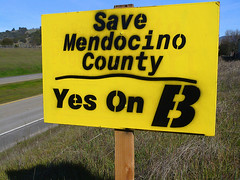Last Modified: Thursday, June 19, 2008 at 5:13 a.m.
Mendocino County election officials are still counting 10,385 absentee ballots from the June 3 election, results that will determine the outcome of a closely watched campaign to repeal the county's liberal marijuana guidelines.
"We hope to be done counting by Friday," said County Clerk Sue Ranochak.
But Ranochak said when the results will be formally announced is uncertain. "I just can't say until we're done," she said.
Interest in the Measure B vote outcome is still intense 16 days after the primary election, judging from the number of daily calls coming into Ranochak's office.
On election night, the county's election Web site crashed because of unexpected heavy volume.
The Measure B fight attracted state and national attention, and drew one of the heaviest local voter turnouts for a primary election despite a near-record low statewide average of 27 percent. Ranochak predicted when Mendocino's turnout is officially calculated, it will be above 50 percent.
Ranochak said Wednesday she's as eager to get the votes counted as people are to know the results. "We know how much interest there is, so we're working hard to get it done," said Ranochak.
On election night, Measure B appeared to win by a 52-48 percent margin. But most of the 16,364 ballots counted then were from the inland areas of Ukiah, Redwood Valley and Potter Valley, where there was strong support for repeal of county marijuana guidelines.
But with the final 40 percent of the vote now being counted, that pattern could continue a shift that began election night.
As the tabulation broadened, Measure B's margin of victory tightened significantly as ballots began to be counted from more marijuana-tolerant regions of the county, including the Mendocino Coast, Anderson Valley and Willits/Laytonville.
Because many of the 10,000 votes still uncounted are from those areas, Measure B's 701-vote victory margin could be overcome.
If Measure B passes, it would repeal current county standards decriminalizing possession and cultivation of up to 25 marijuana plants per person and adopt more restrictive state guidelines of six plants.
Measure B also repeals a directive to local law enforcement to make marijuana prosecution the lowest priority.
A recent state appellate court ruling has raised questions about Measure B's potential effectiveness.
The Los Angeles court ruled that state marijuana guidelines that Measure B seeks to impose locally are unconstitutional.
You can reach Staff Writer Mike Geniella at 462-6470 or mgeniella@pressdemocrat.com.





















1 comment:
Law haze
State needs a ballot measure clarifying 'compassionate use'
Published: Thursday, June 12, 2008 at 4:30 a.m.
Last Modified: Thursday, June 12, 2008 at 5:18 a.m.
Thousands of absentee ballots from the June 3 election are still being counted in Mendocino County. But at last glance, the marijuana roll-back law, Measure B, was headed for victory with a 4 percentage point advantage.
Regardless of the outcome, the closeness of the vote in a county recognized nationwide for its tolerance of marijuana use signals a major change in the public's attitude toward lenient pot laws.
In short, many Californians appear ready to back away from the smell, crime and other problems associated with lax rules governing marijuana use and to return to the "compassionate use" that was the intent of voter-approved Proposition 215 in 1996.
But getting there remains an issue. Supporters of Measure B sought to do it by repealing Mendocino County's existing ordinance,which allows up to 25 plants to be grown for medical as well as recreational use. Instead, the county would abide by the state's limits for medicinal use under SB 420, which allows up to six mature plants or 12 immature plants per qualified medicinal user.
But just as Mendocino County was on the verge of relying on the state's guidelines, those rules were being tossed out. In early May, the state Court of Appeal in Los Angeles overturned the guidelines set by the state Legislature in 2003 as unconstitutional, saying that although the Legislature was trying to provide clarity where it did not exist in the poorly worded Proposition 215, only the voting public could amend the initiative.
State Attorney General Jerry Brown has pledged to appeal the ruling to the state Supreme Court. Hope of bringing some form of clarity to this hodgepodge of local and state laws on marijuana use may rest with the success of that challenge.
Barring that, the best outcome would be a new state ballot measure that would, once and for all, provide the clarity that Proposition 215 was lacking. State residents still support the "compassionate use" principle -- allowing those battling cancer and other diseases to have access to marijuana.
But even 12 years later, the challenge remains in determining how much is enough -- and setting limits on the cultivation and possession of marijuana without creating opportunities for those whose ultimate goal is to capitalize on illegal marijuana sales.
We don't know what the number is. But if a majority of Mendocino County voters, a region considered the heart of the nation's "marijuana belt," considers the state's standards to be sufficient, that seems like a good place to start.
Either way, it appears the state's experimental use of lenient pot laws is coming to an end.
http://www1.pressdemocrat.com/article/20080612/OPINION03/806120338
Post a Comment